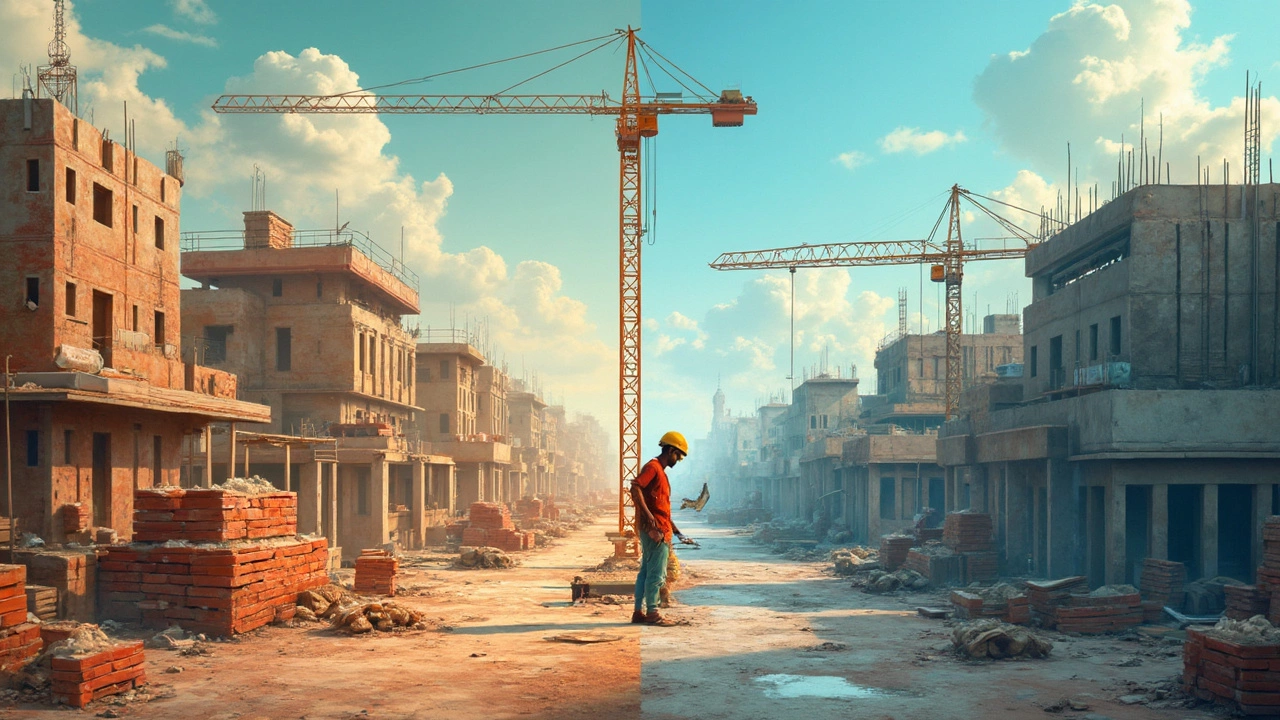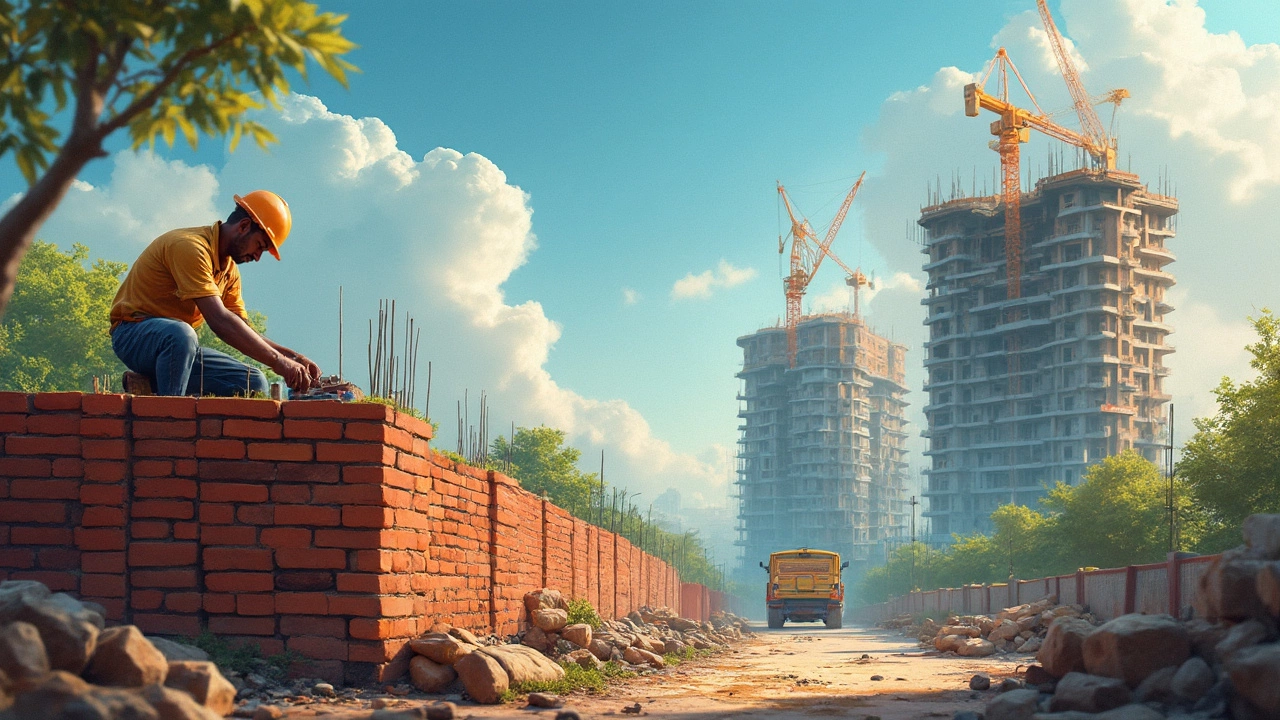Ever wonder who to call when you have a construction project on your hands? Well, here's a little secret: it's not a one-size-fits-all situation. Builders and construction companies serve different purposes, and choosing the right one is key to a successful project.
A builder is often your go-to person for smaller tasks or residential projects. Think of them as the hands-on guys who get the nitty-gritty done. They're the ones swinging the hammer and making sure your kitchen renovation goes off without a hitch.
On the flip side, construction companies are like the project managers of the construction world. They handle the bigger stuff—like building that new office block downtown. They coordinate all the moving parts, from permits to contractors, to ensure everything runs smoothly.
- Defining a Builder
- Understanding Construction Companies
- Choosing the Right Option for Your Project
- Tips for Working with Construction Professionals
Defining a Builder
So, what exactly is a builder? Think of them as the versatile hands-on experts. Builders are typically involved in residential and small-scale projects. They're your go-to folks when you want to spruce up your kitchen or add that deck you've always wanted.
A builder usually takes on projects that involve construction, renovations, or repairs in homes and smaller places. These guys have a knack for understanding blueprints and making sure everything aligns perfectly, from the foundation to the finishing touches. They're skilled at a range of tasks, from carpentry to plumbing, often hiring specialists when needed to get the job done.
Got a passion project or a vision for your dream home? A builder is like the orchestrator who ensures each element comes together seamlessly. They not only manage the workload but also navigate building codes and regulations to keep everything on the up and up.
Builders are often the heart of the construction industry, bridging the gap between complex plans and tangible results. While they often work independently or in small teams, they can also be part of a larger construction company, tackling specific parts of a bigger project.
Here’s a quick look at what most builders do:
- Conduct site inspections and feasibility studies.
- Prepare cost estimates and timelines.
- Work with architects to understand detailed designs.
- Manage and perform construction tasks.
- Ensure compliance with safety and building laws.
By understanding the role of a builder, you're on your way to making smarter decisions for your construction needs!
Understanding Construction Companies
When it comes to large-scale projects, a construction company is where the magic happens. Think of these companies as the planners and executers of massive developments. They handle everything from skyscrapers and shopping malls to entire residential communities. Every detail, from permits to subcontractors, falls under their responsibility.
Most construction companies employ a diverse range of professionals. They have architects who bring creative visions to life, engineers who ensure everything stands the test of time, and project managers who keep all moving parts in check. These pros collaborate to meet deadlines without compromising on quality. It’s a well-orchestrated symphony that demands expertise and teamwork.
In terms of logistics, construction firms deal with an array of complexities. They schedule deliveries, hire skilled workers, and keep track of timelines. This becomes especially important in urban projects where delays can be costly nightmares. Many companies today use advanced software tools to streamline operations, improve communication, and enhance efficiency.
Here's an interesting tidbit: according to a 2023 industry report, the global construction market has been growing at an annual rate of 7.5%. With such rapid expansion, working with a reliable construction company can make a real difference in managing such growth demands. Below is a quick table illustrating some standout figures:
| Year | Global Construction Market Value (in trillion USD) |
|---|---|
| 2020 | 11.4 |
| 2023 | 14.6 |
| 2025 | Expected 16.2 |
Choosing the right construction company is crucial. Look for ones with a history of successful projects and satisfied clients. Don’t shy away from asking for references or checking online reviews. Remember, the right fit will save you time, stress, and potentially big bucks down the line.

Choosing the Right Option for Your Project
Picking between a builder and a construction company really boils down to what you need. It’s like choosing between a reliable old sedan and a heavy-duty truck—each has its own perks. Here’s the lowdown on how to make the best choice.
If you're looking at something manageable, say, building a deck or a home renovation, a builder is your best bet. They’re often more nimble, able to tackle a residential project with personalized attention and fewer overheads. Builders are usually your friendly neighborhood contractors who have been in the game long enough to offer insight and hands-on skills.
But let’s say you're thinking bigger—like a commercial site or a multi-unit development. This is where a construction company steps in. They bring a wealth of resources, including a network of subcontractors, architects, and engineers, which enables them to manage large-scale projects efficiently.
Being clear about the construction tasks you need tackled helps. Here’s a quick checklist to guide you:
- Is the project scope small or large?
- Do you need specialized skills or just general home improvements?
- What’s your budget like? Is it flexible enough for the overhead that comes with larger firms?
- Are you under any time constraints that require faster completion that a team might handle better?
Builders are usually more affordable and can stick closer to your schedule for smaller work, while construction companies have the capacity and expertise for timely delivery on grander projects.
Tips for Working with Construction Professionals
Stepping into the world of construction can be a bit like navigating a maze. The path to success is dotted with choices, from picking the right builder or construction company to ensuring everything goes without a hitch. Here’s how you can ace it.
Communicate Clearly: This might seem like a no-brainer, but clear communication is the backbone of any successful project. Make sure you’re on the same page with your construction team about the timeline, budget, and expectations. A simple weekly check-in can prevent misunderstandings from snowballing.
Do Your Homework: Not all builders or construction companies are created equal. Check their reviews, ask for references, and, if possible, see their previous work. This little bit of effort can save you from future headaches.
Have a Detailed Contract: A solid contract can be your lifesaver. It should outline the scope of the project, payment terms, deadlines, and what happens if there’s a delay. Don’t skip over the fine print; it might contain crucial details.
Be Ready for the Unexpected: Even with the best planning, things can pop up. Be flexible and ready to adapt. Having a buffer in your budget and timeline can help you manage any surprises that come your way.
| Aspect | Builder | Construction Company |
|---|---|---|
| Project Size | Smaller projects | Larger, complex projects |
| Team | Mostly independent or small teams | Larger, diverse teams |
| Scope | Specialized tasks | End-to-end management |
Understanding these nuances not only saves time but can also prevent costly errors. Whether you pick a builder for your home renovations or hire a full-blown construction company for that commercial skyscraper, these tips help smooth the path to your project goals.
